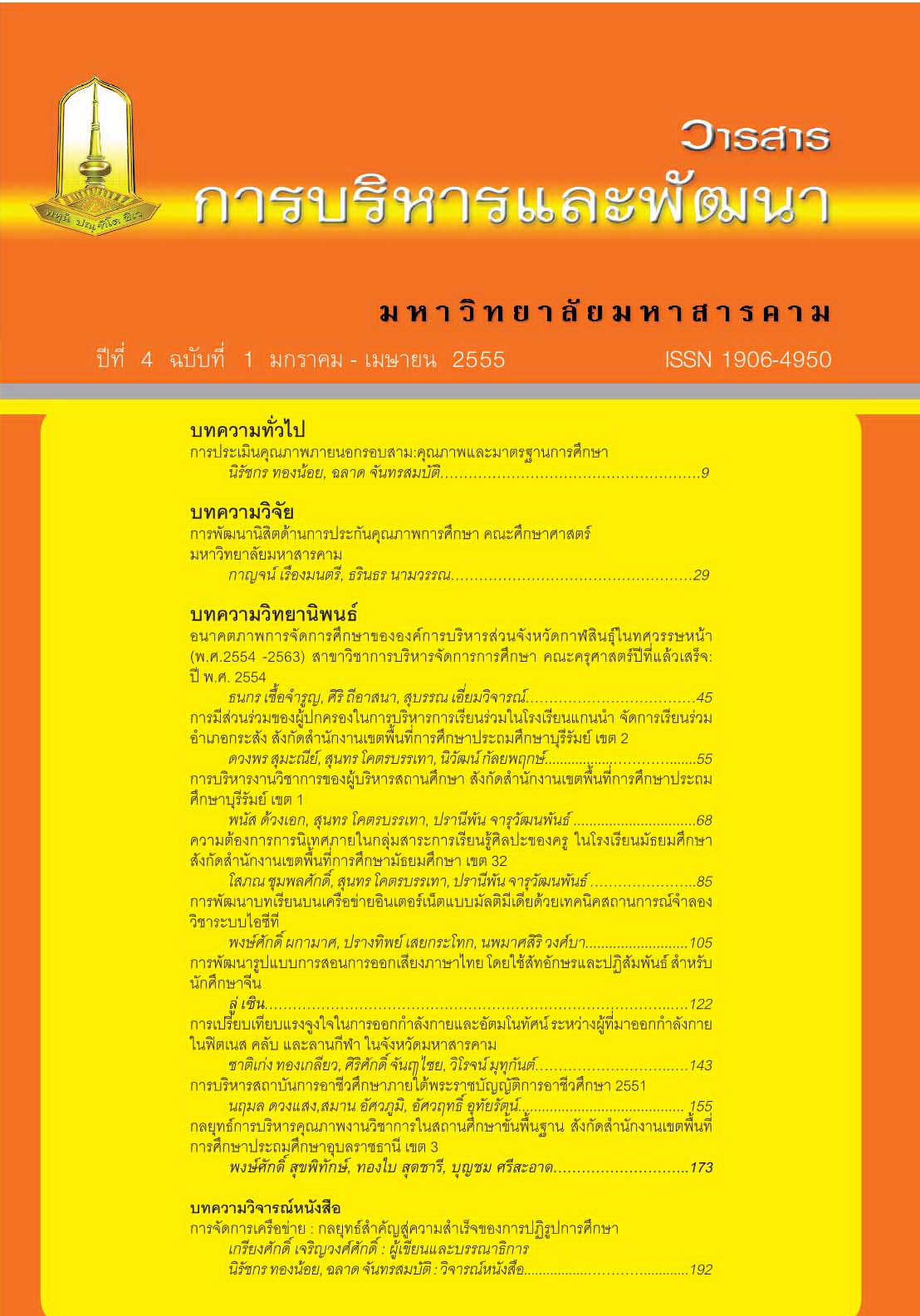กลยุทธ์การบริหารคุณภาพงานวิชาการในสถานศึกษาขั้นพื้นฐาน สังกัดสำนักงานเขตพื้นที่การศึกษาประถมศึกษาอุบลราชธานี เขต 3
Main Article Content
Abstract
บทคัดย่อ
การวิจัยครั้งนี้มีวัตถุประสงค์เพื่อศึกษาสภาพและปัญหาการบริหารงานวิชาการใน สถานศึกษาขั้นพื้นฐาน สังกัดสำนักงานเขตพื้นที่การศึกษาประถมศึกษาอุบลราชธานี เขต 3 เพื่อพัฒนาเกณฑ์มาตรฐานการบริหารคุณภาพงานวิชาการในสถานศึกษาขั้นพื้นฐาน และ เพื่อเสนอกลยุทธ์การบริหารคุณภาพงานวิชาการในสถานศึกษาขั้นพื้นฐาน สังกัดสำนักงาน เขตพื้นที่การศึกษาประถมศึกษาอุบลราชธานี เขต 3 กลุ่มตัวอย่างที่ใช้เพื่อเก็บรวบรวมข้อมูล ศึกษาวิเคราะห์คือกลุ่มผู้บริหารสถานศึกษา สังกัดสำนักงานเขตพื้นที่การศึกษาประถมศึกษา อุบลราชธานี เขต 3 จำนวน 140 คน มีการดำเนินการ 3 ขั้นตอนคือ (1) ศึกษาสภาพปัจจุบันและปัญหาของการบริหารงานวิชาการในสถานศึกษาขั้นพื้นฐาน (2) พัฒนาเกณฑ์มาตรฐาน การบริหารคุณภาพวิชาการในสถานศึกษาขั้นพื้นฐาน และ (3) กำหนดกลยุทธ์การบริหาร คุณภาพงานวิชาการในสถานศึกษาขั้นพื้นฐาน
ผลการวิจัยพบว่าสถานศึกษาขั้นพื้นฐานสังกัดสำนักงานเขตพื้นที่การศึกษาประถมศึกษาอุบลราชธานี เขต 3 ทุกแห่ง มีการบริหารงานวิชาการตามขอบข่ายงานวิชาการ 10 ด้าน คือ การวางแผนงานวิชาการการบริหารหลักสูตรการบริหารการจัดการเรียนการสอนการวัดผล และประเมินผลการเรียนรู้ของผู้เรียน การนิเทศการศึกษา การบริหารสื่อ เทคโนโลยีและแหล่ง เรียนรู้ การวิจัยทางการศึกษา การบริหารข้อมูลสารสนเทศ การประกันคุณภาพ และการส่ง เสริมทางวิชาการแก่ชุมชน ปัญหาการบริหารงานวิชาการที่เป็นปัญหามากที่สุดคือ ขาดแคลน ครูและบุคลากรทางการศึกษาทำให้สูญเสียศักยภาพในการสร้างคุณภาพงานวิชาการรองลง มาคือขาดทีมงานวิชาการที่เข้มแข็ง ทำให้ระดับผลการปฏิบัติงานไม่บรรลุวัตถุประสงค์และผู้ บริหารสถานศึกษาขั้นพื้นฐานนำกิจกรรมคุณภาพเข้ามาใช้ในสถานศึกษามีเพียง 3 กิจกรรม จากทั้งหมด 9 กิจกรรม คือ วงจรคุณภาพของ Deming (PDCA)(ร้อยละ 100) กิจกรรม 5 ส (ร้อยละ 97.80) และกิจกรรมควบคุมคุณภาพครบวงจร(QCC) (ร้อยละ82.70)
เกณฑ์มาตรฐานการบริหารงานวิชาการในสถานศึกษาขั้นพื้นฐาน มี 7 ด้าน คือ 1) สภาวะผู้นำของผู้บริหารสถานศึกษา 2) การวางแผนกลยุทธ์ 3) การมุ่งเน้นคุณภาพผู้เรียน 4) สารสนเทศและการวิเคราะห์งานวิชาการ 5) การพัฒนาครูและบุคลากรทางการศึกษา 6) การควบคุมกระบวนการทำงาน 7) การประเมินผลการดำเนินงานวิชาการ
กลยุทธ์ในการบริหารคุณภาพงานวิชาการในสถานศึกษาขั้นพื้นฐาน สังกัดสำนักงาน เขตพื้นที่การศึกษาประถมศึกษาอุบลราชธานี เขต 3 ประกอบด้วยกลยุทธ์หลัก 5 ด้าน คือ 1) ด้านความรับผิดชอบของผู้บริหาร 2) ด้านการมีส่วนร่วม 3) ด้านการจัดสรรทรัพยากร 4) ด้าน การควบคุมกระบวนการทำงาน และ 5) ด้านการตรวจติดตามผลการดำเนินงาน กลยุทธ์หลัก แต่ละด้านมีกลยุทธ์ระดับแผนงานซึ่งรวมทั้งหมด 13 กลยุทธ์ และกลยุทธ์ระดับโครงการซึ่ง รวมทั้งหมด 42 กลยุทธ์ เสนอไว้สอดคล้องกับเกณฑ์มาตรฐานการบริหารคุณภาพงานวิชาการ ในสถานศึกษาขั้นพื้นฐานที่จะใช้ประเมินผลการดำเนินงาน
คำสำคัญ : กลยุทธ์การบริหารคุณภาพ, งานวิชาการ, สถานศึกษาขั้นพื้นฐาน
Abstract
The purposes of this study were (1) To investigate the state and problems of academic administration in basic educational institutions, (2) To develop standardized criteria for academic administration in basic educational institutions, and (3) To propose the strategies of academic administration in basic educational institutions under the Jurisdiction of the Office of Primary Educational Service Area 3. A total of 140 administrators of Basic Education Institutions under the Jurisdiction of the Office of Primary Educational Service Area 3 were used as the samples of the study. The study compiled of three steps: (1) The investigation of states and problems of academic administration in basic institutions; (2) The development of standardized criteria for academic administration in basic educational institutions; and (3) The propose of the strategies of academic administration in basic educational institutions under the jurisdiction of the Office of Primary Educational Service Area 3.
The research results were as follows:
Basic educational institutions under the Office of Primary EducationalService Area 3 were found to exercise the academic administration involving 10 aspects of academic scope namely academic planning, curriculum administration, learning and teaching, measurement and evaluation, supervision, media and technology administration and learning sources, educational research, information administration, educational quality assurance, and academic promotion. The most problematic aspects of academic administration included the lack of teachers and educational personnel that led to insufficiency of potential in keeping academic quality, followed by the lack of strong academic teamwork resulting in incapability to perform educational tasks to meet the set up goals. The quality activities found to be applied to the institutions by the administrators concerned only 3 activities that a total of 9 activities namely Deming’s quality cycle (PDCA)(100%), ‘5-Sor’ activities (97.80%), and quality control cycle (QCC) (82.70%).
The standardized criteria for academic administration involved 7 aspects, that is, 1) leadership of the administrators of the institutions, 2) strategic planning, 3) focus of learner quality, 4) information and academic analysis, 5) development of teachers and educational personnel, 6) work performance control, and 7) academic performance evaluation.
The strategies for academic administration of basic educational institutions under Office of Primary Educational Service Area 3 included 5 aspects: 1) responsibility of the administrators, 2) participation, 3) managing resources, 4) controlling work processes, and 5) monitoring and following up of work performance. Each of the strategies also included planning strategy level that a total of 13 strategy level and project strategy level that a total of 42 strategy level which were proposed in accordance with the standardized criteria of academic quality administration for using in work performance evaluation.
Keywords : the strategies of quality management, academic affairs, basic school

